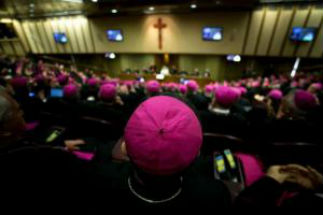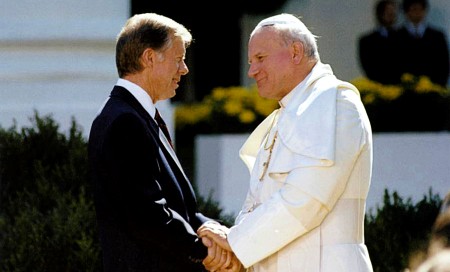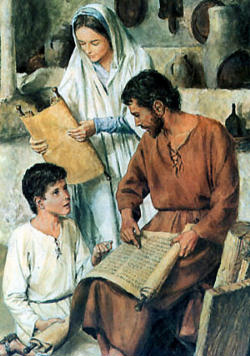 Dear readers, Catholic Online was de-platformed by Shopify for our pro-life beliefs. They shut down our Catholic Online, Catholic Online School, Prayer Candles, and Catholic Online Learning Resources—essential faith tools serving over 1.4 million students and millions of families worldwide. Our founders, now in their 70's, just gave their entire life savings to protect this mission. But fewer than 2% of readers donate. If everyone gave just $5, the cost of a coffee, we could rebuild stronger and keep Catholic education free for all. Stand with us in faith. Thank you. Help Now >
Dear readers, Catholic Online was de-platformed by Shopify for our pro-life beliefs. They shut down our Catholic Online, Catholic Online School, Prayer Candles, and Catholic Online Learning Resources—essential faith tools serving over 1.4 million students and millions of families worldwide. Our founders, now in their 70's, just gave their entire life savings to protect this mission. But fewer than 2% of readers donate. If everyone gave just $5, the cost of a coffee, we could rebuild stronger and keep Catholic education free for all. Stand with us in faith. Thank you. Help Now >
Pope Francis approves new constitution for Synod of Bishops
FREE Catholic Classes
In a new apostolic constitution, Pope Francis has reformed the Synod of Bishops, creating a mechanism for the assembly's final document to be included in official Church teaching.

Highlights
Catholic Online (https://www.catholic.org)
9/18/2018 (6 years ago)
Published in Europe
Keywords: Pope Francis, approves new constitution, Synod of Bishops
Vatican City, (CNA) - Episcopalis Communio, promulgated by the pope on Sept. 15, establishes that the final document of a synod assembly, drafted and approved by a special commission, can be considered part of the ordinary magisterium " that is, the official teaching of the Church " if it receives a particular level of papal approval.
The constitution does not require the publication of a post-synodal papal document to make its conclusions authoritative, though these have traditionally followed synodal sessions.
The most recent synod, which was held on the theme of the family, was followed by the 2015 post-synodal apostolic exhortation Amoris laetitia.
Cardinal Lorenzo Baldisseri, General Secretary of the Synod of Bishops, presented the new constitution on Sept. 18.
Baldisseri told journalists Tuesday that the pope may wish to publish a document of his own following October's synod on young people, but that the new norms allow him to forego it in favor of adopting the synod's final document as his own.
Should Francis decide to adopt the final synodal document, it would be published with his signature and those of the members of the synod.
The norms provide for a process similar to that followed during the 2015 synod on the family " by which a commission creates the final synodal document, before it is put before the members of the synod for a vote.
This commission is composed of the relator general and general secretary of the particular session of the synod, the secretary general of the synod's permanent secretariat - currently Cardinal Baldisseri - and other members elected by the synod itself. To these, the pope may also add his own personal appointees
Regarding how the final document is to be approved by the membership, Episcopalis Communio refers back to the current "particular law." Accordingly, individual provisions to be adopted in the final document will still require the approval of two-thirds of the synod's members, while a simple majority suffices to reject an item.
The new constitution does, however, urge the synod fathers to seek "moral unanimity" whenever possible.
Once the final document has been prepared and voted on, it is presented to the Holy Father for his approval and publication. At this point, the pope can choose to grant a particular kind of approval to the document, called "in forma specifica" in canon law, by which it would become an act of the pope and part of the ordinary papal magisterium.
Speaking at a press conference in Rome, Cardinal Baldisseri said that the process of receiving this specific papal approval does not require a strictly judicial standard, or depend upon a particular margin of approval by the synod fathers.
Quoting St. John Paul II, the new constitution says that while the synod "normally has a merely consultative function," this "does not diminish its importance." Rather, the vote of the synod fathers "if morally unanimous, has an ecclesial quality that overcomes the merely formal aspect of the consultative vote." This, Baldisseri explained, is more important that a specific margin of voting.
Other sections of the constitution substantially affirm recent synodal processes and regulations, including on the synod's composition and structure, which members have voting rights, and the three distinct synodal phases of preparation, assembly, and implementation.
In the preparatory phase, information on the announced theme of the synod is gathered through study commissions, local consultations conducted through the diocesan bishops, and a pre-synod meeting - if one is convoked. The new norms also provide the option for such pre-synodal meetings to be held at a regional level.
The second phase is the actual assembly of the synodal fathers and other members, while the third phase is the implementation of the synod's conclusions in the particular Churches.
Episcopalis Communio underlines the importance of bishops listening to the voice of lay Catholics, saying that "the Synod of Bishops must increasingly become a privileged instrument for listening to the People of God."
"Although in its composition [the Synod] appears as an essentially episcopal organism, the Synod does not therefore live separate from the rest of the faithful. On the contrary, it is a suitable instrument to give voice to the whole People of God precisely through the Bishops, constituted by God as ~authentic guardians, interpreters and witnesses of the faith of the whole Church, " the document states.
This principle is recognized in the canonical norms of the constitution itself. Article 7 of Episcopalis Communio states that the right of the faithful to send their own contributions for the synod directly to the secretary general "remains integral" to the process.
The Synod of Bishops acts as a temporary and occasional advisory body to the pope on issues of pastoral importance to the Catholic Church. It was established by Bl. Pope Paul VI with the motu proprio Apostolica sollicitudo in 1965.
While the synod itself is a temporary body called into being by the pope, it has a permanent general secretariat in the Roman Curia.
There are three types of synod assemblies a pope can call: ordinary, extraordinary, and special. Next month's meeting will be an extraordinary assembly, as was 2014's synod on the family.
A special assembly is usually convoked to discuss an issue related to a particular geographical region, such as the upcoming special assembly on the Amazon, which will take place in October 2019.
---
'Help Give every Student and Teacher FREE resources for a world-class Moral Catholic Education'
Copyright 2021 - Distributed by Catholic Online
Join the Movement
When you sign up below, you don't just join an email list - you're joining an entire movement for Free world class Catholic education.

-

-
Mysteries of the Rosary
-
St. Faustina Kowalska
-
Litany of the Blessed Virgin Mary
-
Saint of the Day for Wednesday, Oct 4th, 2023
-
Popular Saints
-
St. Francis of Assisi
-
Bible
-
Female / Women Saints
-
7 Morning Prayers you need to get your day started with God
-
Litany of the Blessed Virgin Mary
Reflecting on the Legacy of Jimmy Carter
-

Feast of the Holy Family: Learning to Love, Pray and Live in the School of Nazareth
-

5 Biblical New Year's resolutions all Catholics should aspire to
-
Light a prayer candle for your New Year's resolution!
-
The Deacon Saint Stephen the Proto-Martyr is a Model for all Christians
Daily Catholic
 Daily Readings for Tuesday, December 31, 2024
Daily Readings for Tuesday, December 31, 2024 St. Sylvester: Saint of the Day for Tuesday, December 31, 2024
St. Sylvester: Saint of the Day for Tuesday, December 31, 2024 Prayer for a Blessing on the New Year: Prayer of the Day for Tuesday, December 31, 2024
Prayer for a Blessing on the New Year: Prayer of the Day for Tuesday, December 31, 2024- Daily Readings for Monday, December 30, 2024
- St. Anysia: Saint of the Day for Monday, December 30, 2024
- St. Theresa of the Child Jesus: Prayer of the Day for Monday, December 30, 2024
![]()
Copyright 2024 Catholic Online. All materials contained on this site, whether written, audible or visual are the exclusive property of Catholic Online and are protected under U.S. and International copyright laws, © Copyright 2024 Catholic Online. Any unauthorized use, without prior written consent of Catholic Online is strictly forbidden and prohibited.
Catholic Online is a Project of Your Catholic Voice Foundation, a Not-for-Profit Corporation. Your Catholic Voice Foundation has been granted a recognition of tax exemption under Section 501(c)(3) of the Internal Revenue Code. Federal Tax Identification Number: 81-0596847. Your gift is tax-deductible as allowed by law.








 Daily Readings for Tuesday, December 31, 2024
Daily Readings for Tuesday, December 31, 2024 St. Sylvester: Saint of the Day for Tuesday, December 31, 2024
St. Sylvester: Saint of the Day for Tuesday, December 31, 2024 Prayer for a Blessing on the New Year: Prayer of the Day for Tuesday, December 31, 2024
Prayer for a Blessing on the New Year: Prayer of the Day for Tuesday, December 31, 2024

